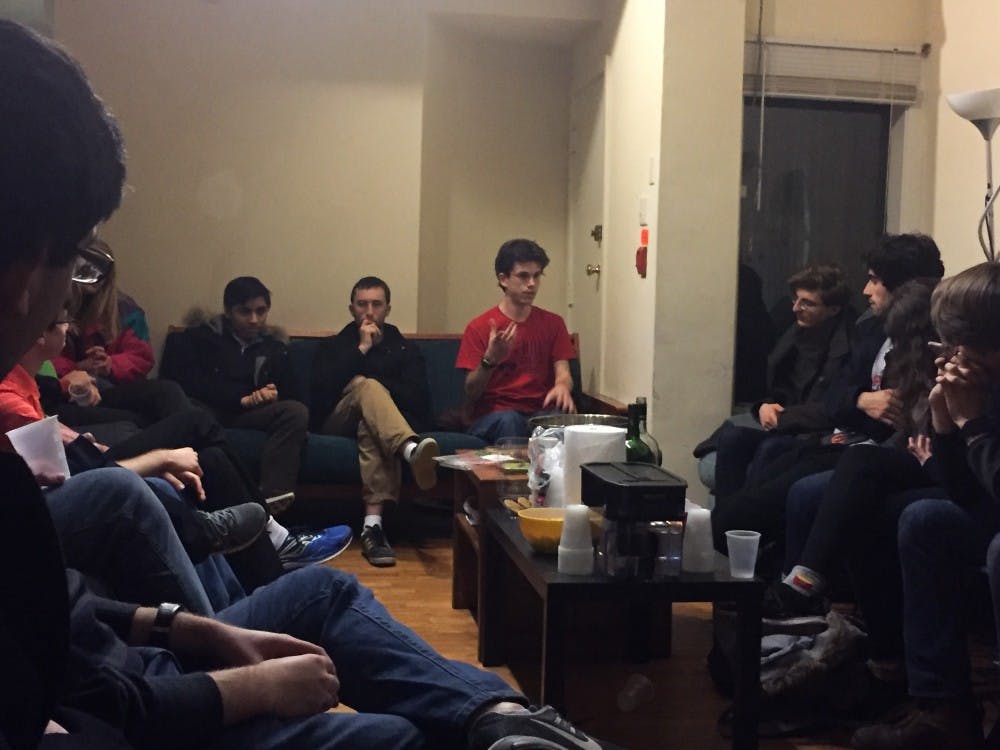
As the focus on rebuilding infrastructure increases in the political sphere, especially following President Donald Trump’s $1 trillion infrastructure investment plan, Penn students gathered to discuss related important issues of gentrification, self-driving cars, and public transportation.
The Polybian Society, Penn Public Transportation Society, Penn Government and Politics Association, and Penn Undergraduate Economics Society held a “Transportation, Infrastructure, and Gentrification” symposium on April 5 at the Polybian House. A student moderator asked attendees questions in an open discussion.
Gentrification is defined as the renovation of deteriorated urban neighborhoods by the influx of more affluent residents. This process tends to increase property value but often displaces low-income families and small businesses. Many at the event discussed the positive and negative implications of this process.
College freshman Sarah Root said that gentrification is only “pushing the problem into different places” and is not an ultimate solution to societal issues such as gun violence, socioeconomic inequality, poverty rates, and racism.
She also added that while students may benefit from the safe “Penn bubble” that formed through gentrification in Philadelphia, not the entire West Philadelphia community benefits from it, and that there are better alternative economic initiatives that could improve safety in West Philadelphia without displacing residents.
A few attendees also added that the University should participate in Payments in Lieu of Taxes, which are payments willingly made by nonprofit organizations to their local governments in place of property tax. A protest at Penn last week called on the University to give back to the city's school system through PILOTs.
Many students at the discussion, however, discussed the benefits of gentrification. For instance, College freshman James Nycz said that despite the government’s bad handling of the issue in the past, gentrification has fostered intellectual, economic, and technological development, as was the case for Times Square in New York.
"I was actually quite surprised with how this discussion went, I thought people would be more against gentrification than they are," Root said.
Nycz said that the benefits of gentrification could be greater and reach more communities through better initiatives, including subsidization of public transportation to facilitate commutes of nearby residents and public education.
During the discussion, students generally agreed that while public transit would offer a possible solution to ineffective transportation systems, such as widespread traffic problems, it needs more government funding for expansion and improvement.
People are hesitant about using public transportation because they feel it is unsafe and inconvenient, Wharton junior Caitlin Allan said people discussed at the events.
She added that, with government funding, making public transportation the main means of transportation will allow for more diversity on the part of riders, which in turn will encourage more people to use public transportation. This, Caitlin said, will help increase the safety — including perceived safety — of using public transportation.
"Public transportation is one great equalizer that can benefit the society," according to College freshman James Nycz. He added that fundamental infrastructure, such as public transportation, should be accessible to travelers and residents for "the global city that Philadelphia is becoming."
The conversation's transition to self-driving cars led to more controversies.
Some were supportive of the prospects of future driverless transit system, which they said will reduce accidents and injuries on the whole despite initial resistance and fear.
Others said that on top of ethical issues of using self-driving cars system, the possibility of mass unemployment, including that of truck drivers, pose another challenge. While some said that self-driving cars would come with gradual progress of job displacement and technological development, others remained skeptical that there would ever be entirely driverless system.
The organizers felt that the symposium's topics were increasingly relevant as cities worldwide are modernizing and improving their infrastructure.
The issues are relevant to Penn, too, Polybian Society Consul and College junior Brianna Raposo said on behalf of the four organizing groups.
"Through our own experiences on campus, living in University City and West Philadelphia, we can see these impacts as institutions like Penn continue to expand into the communities they occupy — by building dorms, dining halls, and academic buildings," Raposo, a former Daily Pennsylvanian staffer, said.
The Daily Pennsylvanian is an independent, student-run newspaper. Please consider making a donation to support the coverage that shapes the University. Your generosity ensures a future of strong journalism at Penn.
Donate







